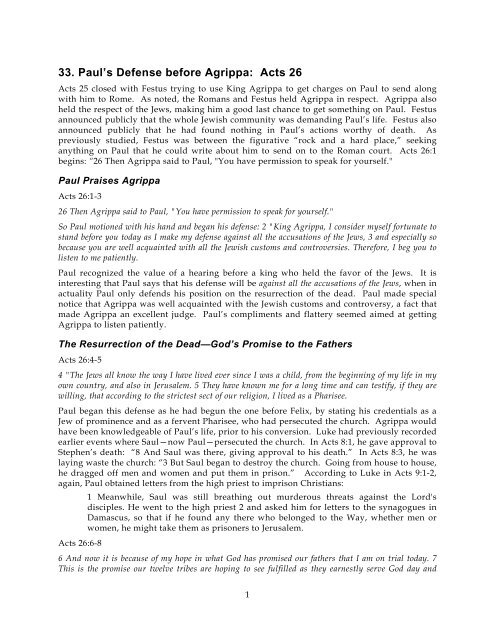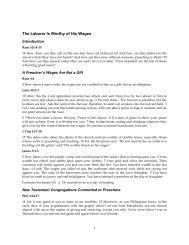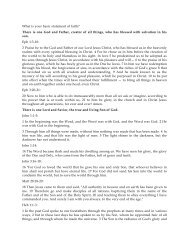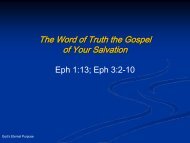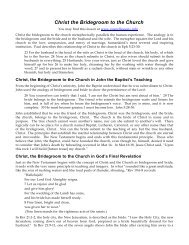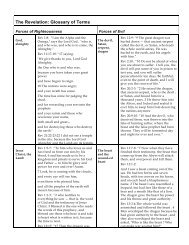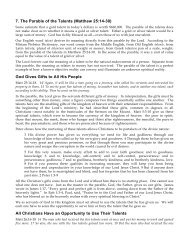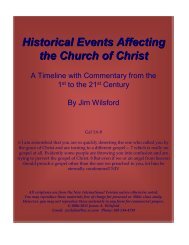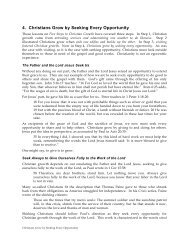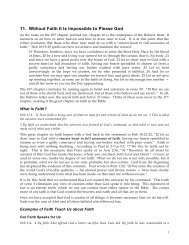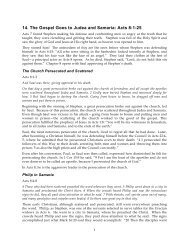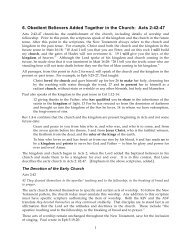33. Paul's Defense before Agrippa: Acts 26 PDF - Gospel Lessons
33. Paul's Defense before Agrippa: Acts 26 PDF - Gospel Lessons
33. Paul's Defense before Agrippa: Acts 26 PDF - Gospel Lessons
- No tags were found...
Create successful ePaper yourself
Turn your PDF publications into a flip-book with our unique Google optimized e-Paper software.
<strong>33.</strong> Paul’s <strong>Defense</strong> <strong>before</strong> <strong>Agrippa</strong>: <strong>Acts</strong> <strong>26</strong><br />
<strong>Acts</strong> 25 closed with Festus trying to use King <strong>Agrippa</strong> to get charges on Paul to send along<br />
with him to Rome. As noted, the Romans and Festus held <strong>Agrippa</strong> in respect. <strong>Agrippa</strong> also<br />
held the respect of the Jews, making him a good last chance to get something on Paul. Festus<br />
announced publicly that the whole Jewish community was demanding Paul’s life. Festus also<br />
announced publicly that he had found nothing in Paul’s actions worthy of death. As<br />
previously studied, Festus was between the figurative “rock and a hard place,” seeking<br />
anything on Paul that he could write about him to send on to the Roman court. <strong>Acts</strong> <strong>26</strong>:1<br />
begins: “<strong>26</strong> Then <strong>Agrippa</strong> said to Paul, "You have permission to speak for yourself."<br />
Paul Praises <strong>Agrippa</strong><br />
<strong>Acts</strong> <strong>26</strong>:1-3<br />
<strong>26</strong> Then <strong>Agrippa</strong> said to Paul, "You have permission to speak for yourself."<br />
So Paul motioned with his hand and began his defense: 2 "King <strong>Agrippa</strong>, I consider myself fortunate to<br />
stand <strong>before</strong> you today as I make my defense against all the accusations of the Jews, 3 and especially so<br />
because you are well acquainted with all the Jewish customs and controversies. Therefore, I beg you to<br />
listen to me patiently.<br />
Paul recognized the value of a hearing <strong>before</strong> a king who held the favor of the Jews. It is<br />
interesting that Paul says that his defense will be against all the accusations of the Jews, when in<br />
actuality Paul only defends his position on the resurrection of the dead. Paul made special<br />
notice that <strong>Agrippa</strong> was well acquainted with the Jewish customs and controversy, a fact that<br />
made <strong>Agrippa</strong> an excellent judge. Paul’s compliments and flattery seemed aimed at getting<br />
<strong>Agrippa</strong> to listen patiently.<br />
The Resurrection of the Dead—God’s Promise to the Fathers<br />
<strong>Acts</strong> <strong>26</strong>:4-5<br />
4 "The Jews all know the way I have lived ever since I was a child, from the beginning of my life in my<br />
own country, and also in Jerusalem. 5 They have known me for a long time and can testify, if they are<br />
willing, that according to the strictest sect of our religion, I lived as a Pharisee.<br />
Paul began this defense as he had begun the one <strong>before</strong> Felix, by stating his credentials as a<br />
Jew of prominence and as a fervent Pharisee, who had persecuted the church. <strong>Agrippa</strong> would<br />
have been knowledgeable of Paul’s life, prior to his conversion. Luke had previously recorded<br />
earlier events where Saul—now Paul—persecuted the church. In <strong>Acts</strong> 8:1, he gave approval to<br />
Stephen’s death: “8 And Saul was there, giving approval to his death.” In <strong>Acts</strong> 8:3, he was<br />
laying waste the church: “3 But Saul began to destroy the church. Going from house to house,<br />
he dragged off men and women and put them in prison.” According to Luke in <strong>Acts</strong> 9:1-2,<br />
again, Paul obtained letters from the high priest to imprison Christians:<br />
1 Meanwhile, Saul was still breathing out murderous threats against the Lord's<br />
disciples. He went to the high priest 2 and asked him for letters to the synagogues in<br />
Damascus, so that if he found any there who belonged to the Way, whether men or<br />
women, he might take them as prisoners to Jerusalem.<br />
<strong>Acts</strong> <strong>26</strong>:6-8<br />
6 And now it is because of my hope in what God has promised our fathers that I am on trial today. 7<br />
This is the promise our twelve tribes are hoping to see fulfilled as they earnestly serve God day and<br />
1
night. O king, it is because of this hope that the Jews are accusing me. 8 Why should any of you<br />
consider it incredible that God raises the dead<br />
Paul made two important points in this initial statement: he is on trial for his hope, the hope<br />
of the fathers and the twelve tribes of Israel; and it should not seem incredible that God raises<br />
the dead. The hope of the fathers that God could raise them from the dead elevates God’s<br />
promises to Abraham, Isaac, and Jacob and the twelve tribes that followed them, from a mere<br />
land promise to the promise of eternal life in an eternal and heavenly kingdom. Paul<br />
expanded the argument stated here in Gal 3:14-16:<br />
14 He redeemed us in order that the blessing given to Abraham might come to the<br />
Gentiles through Christ Jesus, so that by faith we might receive the promise of the<br />
Spirit.<br />
15 . . . Just as no one can set aside or add to a human covenant that has been duly<br />
established, so it is in this case. 16 The promises were spoken to Abraham and to his<br />
seed. The Scripture does not say "and to seeds," meaning many people, but "and to<br />
your seed," meaning one person, who is Christ.<br />
The resurrection of the just and the unjust dominated Paul’s defenses, being the main point of<br />
the gospel. From Luke’s account of Christ’s own charge in <strong>Acts</strong> 24:45-47, the resurrection was<br />
central:<br />
45 Then he opened their minds so they could understand the Scriptures. 46 He told<br />
them, "This is what is written: The Christ will suffer and rise from the dead on the<br />
third day, 47 and repentance and forgiveness of sins will be preached in his name to all<br />
nations, beginning at Jerusalem.<br />
Paul emphasized the resurrection in <strong>Acts</strong> 23:6; “My brothers, I am a Pharisee, the son of a<br />
Pharisee. I stand on trial because of my hope in the resurrection of the dead.” In <strong>Acts</strong> 24:14-<br />
15, Paul stated made the resurrection the hope of the prophets: “I believe everything that<br />
agrees with the Law and that is written in the Prophets, 15 and I have the same hope in God as<br />
these men, that there will be a resurrection of both the righteous and the wicked. “ The<br />
resurrection of the dead was the sticking point with the Jews and the reason they sought to kill<br />
Paul in <strong>Acts</strong> 24:20-21:<br />
Or these who are here should state what crime they found in me when I stood <strong>before</strong><br />
the Sanhedrin— 21 unless it was this one thing I shouted as I stood in their presence: 'It<br />
is concerning the resurrection of the dead that I am on trial <strong>before</strong> you today.'"<br />
Paul based his defense on the firm and solid basis of Christ raised from the dead and the hope<br />
of the gospel that the righteous will follow: “O king, it is because of this hope that the Jews<br />
are accusing me. 8 Why should any of you consider it incredible that God raises the dead”<br />
Paul’s Early Life as One who Persecuted Christians<br />
<strong>Acts</strong> <strong>26</strong>:9-11<br />
9 "I too was convinced that I ought to do all that was possible to oppose the name of Jesus of Nazareth.<br />
10 And that is just what I did in Jerusalem. On the authority of the chief priests I put many of the<br />
saints in prison, and when they were put to death, I cast my vote against them. 11 Many a time I went<br />
from one synagogue to another to have them punished, and I tried to force them to blaspheme. In my<br />
obsession against them, I even went to foreign cities to persecute them.<br />
In Paul’s defense <strong>before</strong> Felix in <strong>Acts</strong> 22:2-5, he had also summarized his Jewish credentials:<br />
2
Then Paul said: 3 "I am a Jew, born in Tarsus of Cilicia, but brought up in this city.<br />
Under Gamaliel I was thoroughly trained in the law of our fathers and was just as<br />
zealous for God as any of you are today. 4 I persecuted the followers of this Way to<br />
their death, arresting both men and women and throwing them into prison, 5 as also<br />
the high priest and all the Council can testify. I even obtained letters from them to their<br />
brothers in Damascus, and went there to bring these people as prisoners to Jerusalem<br />
to be punished.<br />
Not only was Paul a Pharisee, but he was also a dedicated persecutor of Christians<br />
Paul’s Selection as an Apostle<br />
<strong>Acts</strong> <strong>26</strong>:12-16<br />
12 "On one of these journeys I was going to Damascus with the authority and commission of the chief<br />
priests. 13 About noon, O king, as I was on the road, I saw a light from heaven, brighter than the sun,<br />
blazing around me and my companions. 14 We all fell to the ground, and I heard a voice saying to me<br />
in Aramaic, '<br />
Saul, Saul, why do you persecute me It is hard for you to kick against the goads.'<br />
15 "Then I asked, 'Who are you, Lord'<br />
"'I am Jesus, whom you are persecuting,' the Lord replied. 16 'Now get up and stand on your feet. I<br />
have appeared to you to appoint you as a servant and as a witness of what you have seen of me and<br />
what I will show you.<br />
This is the third time Luke has covered the conversion of Paul. The first time was Luke’s<br />
description of Paul’s conversion; the second, Paul’s description of his own conversion <strong>before</strong><br />
Felix; the third, this account by Paul <strong>before</strong> <strong>Agrippa</strong>. In each account, the focus is on Christ’s<br />
calling Paul to be an apostle. In <strong>Acts</strong> 9:15-16, the Lord told Ananias his purpose for Paul: “15<br />
But the Lord said to Ananias, ‘Go! This man is my chosen instrument to carry my name <strong>before</strong><br />
the Gentiles and their kings and <strong>before</strong> the people of Israel. 16 I will show him how much he<br />
must suffer for my name.’” <strong>Acts</strong> 22:14-16 recorded the Lord’s words, as spoken to Paul:<br />
14 "Then he said: 'The God of our fathers has chosen you to know his will and to see<br />
the Righteous One and to hear words from his mouth. 15 You will be his witness to all<br />
men of what you have seen and heard. 16 And now what are you waiting for Get up,<br />
be baptized and wash your sins away, calling on his name.'<br />
Paul tells of this experience as the experience from which he was born to be an apostle in 1 Cor<br />
15:7-9:<br />
7 Then he appeared to James, then to all the apostles, 8 and last of all he appeared to<br />
me also, as to one abnormally born.<br />
9 For I am the least of the apostles and do not even deserve to be called an apostle,<br />
because I persecuted the church of God.<br />
<strong>Acts</strong> <strong>26</strong>:17-18<br />
17 I will rescue you from your own people and from the Gentiles. I am sending you to them 18 to open<br />
their eyes and turn them from darkness to light, and from the power of Satan to God, so that they may<br />
receive forgiveness of sins and a place among those who are sanctified by faith in me.'<br />
Here, Paul stated in powerful terms the purpose for which Christ had called him: to open the<br />
eyes of Jews and Gentiles alike; to turn them from darkness to light; to turn them from the<br />
power of Satan to God. Darkness to light and Satan to God are polar opposites establishing<br />
3
oth domain and power for each. Paul later described the extent and power of Satan’s<br />
domain, which is often clothed in light to deceive the righteous. In Eph 2:1-2, he wrote: “2 As<br />
for you, you were dead in your transgressions and sins, 2 in which you used to live when you<br />
followed the ways of this world and of the ruler of the kingdom of the air, the spirit who is<br />
now at work in those who are disobedient.” In Eph 6:11-12, Christians are to fight against the<br />
evil powers of this dark world and the devil’s schemes:<br />
11 Put on the full armor of God so that you can take your stand against the devil's<br />
schemes. 12 For our struggle is not against flesh and blood, but against the rulers,<br />
against the authorities, against the powers of this dark world and against the spiritual<br />
forces of evil in the heavenly realms.<br />
The struggle will be difficult because of the deceitfulness of Satan and his ministers. 2 Cor<br />
11:13-15 teaches:<br />
13 For such men are false apostles, deceitful workmen, masquerading as apostles of<br />
Christ. 14 And no wonder, for Satan himself masquerades as an angel of light. 15 It is<br />
not surprising, then, if his servants masquerade as servants of righteousness. Their end<br />
will be what their actions deserve.<br />
As Paul fought this battle against the Jews, he knew personally the difficulty of defeating the<br />
powers of darkness. However, for Paul and his converts, the Lord provided the way to<br />
overcome darkness with light. In Eph 5:8-11, Paul wrote:<br />
8 For you were once darkness, but now you are light in the Lord. Live as children of<br />
light 9 (for the fruit of the light consists in all goodness, righteousness and truth) 10<br />
and find out what pleases the Lord. 11 Have nothing to do with the fruitless deeds of<br />
darkness, but rather expose them.<br />
Even in conversion, Christians, then and now, overcome darkness, according to Col 1:13-14:<br />
“13 For he has rescued us from the dominion of darkness and brought us into the kingdom of<br />
the Son he loves, 14 in whom we have redemption, the forgiveness of sins.”<br />
Why the Jews Seek Paul’s Life<br />
<strong>Acts</strong> <strong>26</strong>:19-23<br />
19 "So then, King <strong>Agrippa</strong>, I was not disobedient to the vision from heaven. 20 First to those in<br />
Damascus, then to those in Jerusalem and in all Judea, and to the Gentiles also, I preached that they<br />
should repent and turn to God and prove their repentance by their deeds. 21 That is why the Jews<br />
seized me in the temple courts and tried to kill me. 22 But I have had God's help to this very day, and<br />
so I stand here and testify to small and great alike. I am saying nothing beyond what the prophets and<br />
Moses said would happen— 23 that the Christ would suffer and, as the first to rise from the dead,<br />
would proclaim light to his own people and to the Gentiles."<br />
In this passage, Paul stated the gospel message to all men, Jews of Jerusalem and Judea and all<br />
the Gentiles, in most simple and commanding terms: repent, turn to God, and prove<br />
repentance by deeds. That was what Paul preached and that is what we should preach in the<br />
21 st century. The gospel foretold by Moses and the prophets was the gospel Paul preached:<br />
Christ suffered, died, was the first raised from the dead, and proclaims light to his own people<br />
[the Jews] and to the Gentiles. That is why the Jews seized Paul and tried to kill him.<br />
Festus and <strong>Agrippa</strong> Respond<br />
<strong>Acts</strong> <strong>26</strong>:24-32<br />
4
24 At this point Festus interrupted <strong>Paul's</strong> defense. "You are out of your mind, Paul!" he shouted.<br />
"Your great learning is driving you insane."<br />
25 "I am not insane, most excellent Festus," Paul replied. "What I am saying is true and reasonable.<br />
<strong>26</strong> The king is familiar with these things, and I can speak freely to him. I am convinced that none of<br />
this has escaped his notice, because it was not done in a corner. 27 King <strong>Agrippa</strong>, do you believe the<br />
prophets I know you do."<br />
28 Then <strong>Agrippa</strong> said to Paul, "Do you think that in such a short time you can persuade me to be a<br />
Christian"<br />
29 Paul replied, "Short time or long — I pray God that not only you but all who are listening to me<br />
today may become what I am, except for these chains."<br />
30 The king rose, and with him the governor and Bernice and those sitting with them. 31 They left the<br />
room, and while talking with one another, they said, "This man is not doing anything that deserves<br />
death or imprisonment."<br />
32 <strong>Agrippa</strong> said to Festus, "This man could have been set free if he had not appealed to Caesar."<br />
Festus—a Roman with only a worldly background—immediately rejected Paul’s teaching as<br />
that of an insane man. Paul countered that his position was true and reasonable, and turned<br />
to <strong>Agrippa</strong> for confirmation, putting the question straight to him: “King <strong>Agrippa</strong>, do you<br />
believe the prophets” Paul’s conclusion, “I know you dom.” focused on an eternal truth: If<br />
one believes the prophets, he must believe in the Christ, resurrected, as the first born from the<br />
dead, through whom all men may have the same hope.<br />
<strong>Agrippa</strong> deferred Paul’s question without answer by saying that Paul could not persuade him<br />
in such a short time. Paul’s final plea had nothing to do with his own freedom, but rather, it<br />
was a prayer that all men become, as he was, a Christian with hope of the resurrection to<br />
eternal life.<br />
<strong>Agrippa</strong> and Festus concurred in their conclusion that Paul was doing nothing that deserved<br />
death or imprisonment. According to <strong>Agrippa</strong>, Paul could have gone free had he not appealed<br />
to Caesar.<br />
In <strong>Acts</strong> 27, the scene shifts quickly as Paul and his cohorts sail for Italy.<br />
5


